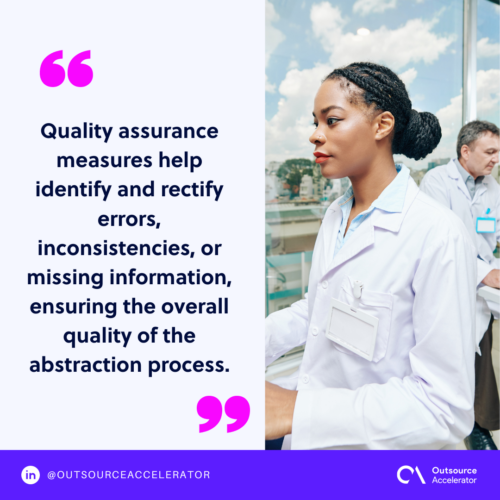Pros and cons of outsourcing clinical data abstraction in healthcare project outcomes

Data is more than spreadsheet numbers. In healthcare, it’s the lifeblood of innovation, patient care, and research.
As stakeholders strive to deliver high-quality care and innovative solutions, the need for accurate and timely data abstraction has become a linchpin for success.
Amidst this demand, organizations are increasingly looking towards outsourcing solutions to enhance project outcomes. This shift towards external expertise introduces a new dimension to healthcare operations.
In this article, we’ll explore the implications, both positive and negative, of outsourcing clinical data abstraction.
What is clinical data abstraction?
Clinical data abstraction is the process of extracting specific information from medical records and other healthcare documents. This information is usually collected for various purposes, such as:
- Research
- Quality improvement
- Clinical trials
- Regulatory reporting
The goal of clinical data abstraction is to transform unstructured medical information into structured and usable data. This data can then be used to generate insights, improve patient care, and meet compliance requirements.
It’s a critical task in healthcare because it ensures that accurate and relevant information is available for decision-making and analysis.

Key steps of clinical data abstraction
Clinical data abstraction involves several key processes that are essential for extracting and analyzing relevant data from medical records and other clinical documentation.
The primary processes of clinical data abstraction include:
1. Identification of relevant data points
The first step in clinical data abstraction is identifying the specific data points that are pertinent to the project or study. This involves determining the key information needed for analysis, quality measurement, or research purposes.
By clearly defining the data elements required, abstraction specialists can focus on extracting meaningful and actionable insights from the documentation.
2. Data collection
Once the relevant data points have been identified, the next crucial process is the collection of data. Clinical data abstractors meticulously review medical records, patient charts, lab results, and other sources of healthcare information to extract the necessary data elements.
This process requires attention to detail and adherence to standardized protocols to ensure accuracy and completeness in data collection.
3. Data extraction and coding
After data collection, abstraction specialists extract the identified data points and code them using standardized terminologies or classification systems.
This step involves transforming the information from the source documents into a structured format that can be easily analyzed and interpreted. Proper coding ensures consistency and enables efficient data processing and analysis.
4. Data validation and quality assurance
Data validation and quality assurance are essential components of clinical data abstraction to maintain the integrity and reliability of the extracted data.
Abstraction specialists conduct thorough checks to verify the accuracy, consistency, and completeness of the abstracted data.
Quality assurance measures help identify and rectify errors, inconsistencies, or missing information, ensuring the overall quality of the abstraction process.

5. Data summarization and reporting
The final step in clinical data abstraction involves summarizing the information for analysis, reporting, or decision-making purposes. Abstractors create concise summaries or reports that present the key findings, trends, and insights derived from the abstracted data.
These summaries provide valuable information that can inform clinical practice, research studies, quality improvement initiatives, and other healthcare projects.
Advantages and disadvantages of outsourcing clinical data abstraction
To assess the impact of outsourcing clinical data abstraction, it’s helpful to look at both the advantages and disadvantages.
Advantages of outsourcing clinical data abstraction
Outsourcing clinical data abstraction offers several advantages, particularly for healthcare organizations looking to streamline processes, reduce costs, and enhance data quality.
Here are some key benefits:
Access to specialized expertise
Outsourcing providers often employ experienced professionals with specialized skills in clinical data abstraction, coding, and compliance.
These experts are knowledgeable about the latest healthcare regulations, coding standards, and best practices. They perform accurate and efficient data extraction, reducing the likelihood of errors and improving data quality.
Cost efficiency
Outsourcing can be more cost-effective than maintaining an in-house team for clinical data abstraction. Healthcare organizations can save on salaries, training, technology, and infrastructure costs.
Outsourcing providers often offer scalable services, allowing organizations to adjust their level of support based on project needs, thus avoiding the expense of hiring and training additional staff.
Scalability and flexibility
Outsourcing allows healthcare organizations to scale their data abstraction efforts up or down as needed.
Whether handling a large influx of information for a specific project or maintaining ongoing data abstraction needs, outsourcing provides the flexibility to adjust resources quickly.
This is particularly valuable in situations with fluctuating workloads, such as during clinical trials or when implementing new healthcare initiatives.
Improved turnaround times
Dedicated outsourcing teams can often complete data abstraction tasks more quickly than in-house teams.
Focusing solely on data abstraction, outsourcing providers can deliver faster turnaround times, enabling healthcare organizations to meet deadlines and make timely decisions.
This is especially critical in time-sensitive situations, such as reporting for regulatory compliance or initiating new treatments.
Access to advanced technology and tools
Many outsourcing providers invest in state-of-the-art technology and tools for data abstraction. These advanced systems can improve data accuracy, streamline workflows, and enhance data security.
Outsourcing organizations often stay up-to-date with the latest technological advancements. Healthcare providers benefit from cutting-edge solutions without needing to invest in expensive technology themselves.
Risk mitigation
Outsourcing providers frequently implement strong risk management and compliance procedures. They are well-versed in healthcare regulations, data privacy laws, and industry standards.
By partnering with a reputable outsourcing provider, healthcare organizations can reduce the risk of non-compliance, data breaches, and other legal issues.
Enhanced data quality and consistency
Outsourcing providers typically have stringent quality assurance processes. These processes help ensure that the abstracted data is accurate, consistent, and reliable.
High-quality data is crucial for informed decision-making, effective research, and quality improvement initiatives in healthcare.
Disadvantages of outsourcing clinical data abstraction
While outsourcing clinical data abstraction offers many advantages, it also comes with potential drawbacks. Healthcare organizations must consider these disadvantages to make informed decisions.
Here are some key disadvantages of outsourcing clinical data abstraction:
Loss of control and oversight
Outsourcing involves entrusting data abstraction tasks to an external organization. This can lead to a perceived or actual loss of control over the quality, timeliness, and processes involved in data abstraction.
Organizations may have limited visibility into the outsourcing provider’s day-to-day operations, making it harder to enforce standards and protocols.
Potential quality issues
The quality of data abstraction can vary depending on the provider’s expertise and processes. There is a risk of inconsistent or inaccurate data extraction, especially if the outsourcing provider lacks experience in specific medical specialties or healthcare settings.
Poor-quality data can compromise the validity of research, clinical decisions, and compliance reporting.
Dependence on external vendors
Outsourcing creates a reliance on external providers for critical data services. Organizations may become dependent on their outsourcing partners, making it difficult to switch providers or bring the process back in-house.
This dependence can also lead to challenges if the vendor experiences disruptions, such as financial instability, staffing issues, or technical problems.
Integration and compatibility issues
Integrating outsourced data with an organization’s existing systems and processes can be challenging.
Compatibility issues may arise if the outsourcing provider uses different technologies, software, or data formats. These issues can lead to delays, additional costs, or technical difficulties in merging and utilizing the abstracted data.
Loss of institutional knowledge
In-house teams often possess valuable institutional knowledge and context. Outsourcing can result in a loss of this knowledge, which may be critical for accurate data abstraction.
External providers may lack an understanding of the organization’s unique practices, historical data, or specific project nuances. This could lead to less accurate or relevant data extraction.
Ultimately, the decision to outsource this critical function should be carefully weighed against the specific needs and priorities of your healthcare organization, ensuring that the benefits outweigh the potential drawbacks and align with your long-term objectives.







 Independent
Independent




